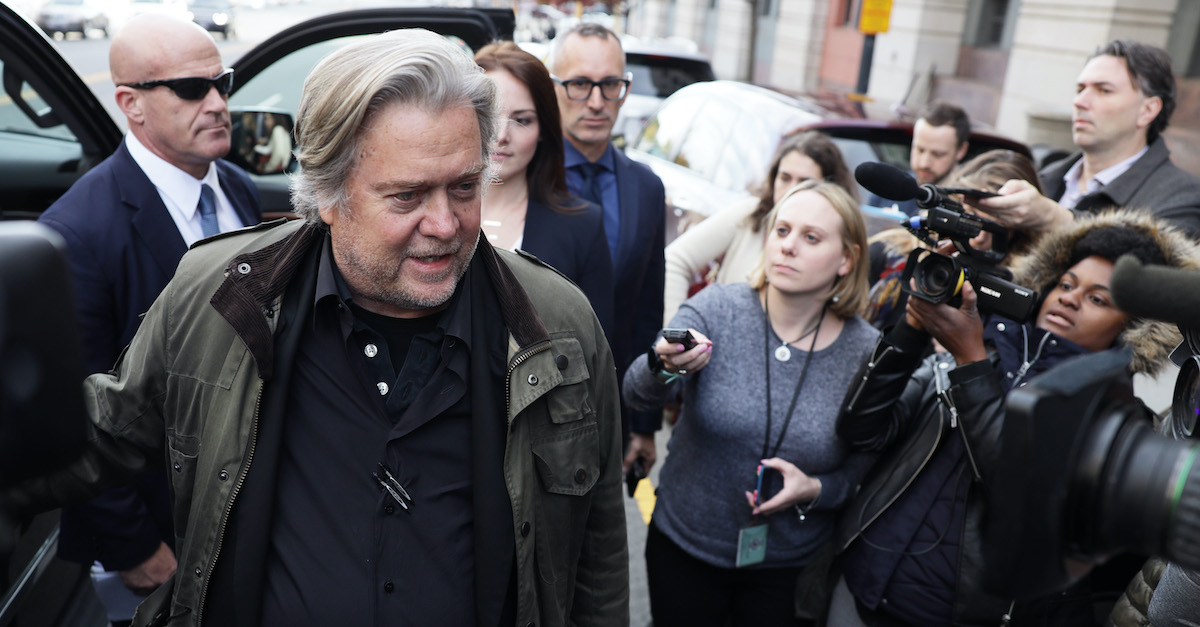
In a remarkable stretch of post-pardon litigation, federal prosecutors have urged a judge to administratively close Steve Bannon’s case without booting his indictment, and lawyers for the ex-Donald Trump strategist opposed that option as unfair and “inadequate.”
Late on Thursday night, prosecutors reiterated their position while preparing for a third option: If District Judge Analisa Torres were to grant Bannon’s request for dismissal, the government wants it to be just as narrow as Trump crafted his pardon.
“If the court is inclined to dismiss the indictment as to Bannon, the government respectfully submits that any order of dismissal should conform to the language and scope of the pardon,” Assistant U.S. Attorney Nicolas Roos wrote in a 2-page letter.
Some legal experts believe the move could signal plans for prosecutors to pursue Bannon on other charges.
Before Trump’s 11th hour pardon, Bannon had been charged with fraud and money laundering conspiracies involving We Build the Wall, a non-profit crowdfunding initiative to construct a barrier on the U.S.-Mexico border. The group told donors that every dime would go toward construction, but prosecutors claim that Bannon pocketed $1 million.
In an interview last month with the Law&Crime podcast “Objections,” CNN analyst Jennifer Rodgers—who spent more than a decade as a Southern District of New York prosecutor—unpacked the government’s insistence on keeping the indictment live and narrow.
“It is possible that they want that indictment to stand so that they don’t have to go back and put in all the evidence against him to charge him with new offenses,” Rodgers said in an interview.
In an article for the Just Security blog, Andrew Weissmann—a former member of Robert Mueller’s team during the Russia investigation—argued that Trump’s spate of pardons for his associates left room to charge them for other offenses, including in Bannon’s case.
“If this grand jury that heard the evidence against Bannon is still there—it’s still in existence—[federal prosecutors] have the opportunity to go back to that grand jury and say, ‘We want to supersede this indictment against Steve Bannon,” Rodgers said, citing Weissman’s post in support of that possibility. “We’re going to add these charges. Here’s what these charges are. Please consider all of the evidence that you’ve previously heard about Steve Bannon and vote on whether these new charges meet your standards so on.’”
“So they could do that in 15 minutes,” Rodgers added.
Whether Bannon’s indictment is tossed or his docket closed administratively, prosecutors agree that this chapter of his case has ended.
“However, the Government respectfully submits that there is neither a need for an order dismissing the Indictment nor any authority mandating such an outcome on these facts,” Roos wrote. “Instead, the government submits that the court can and should direct the clerk of court to terminate Bannon as a defendant in this case and have the docket sheet reflect the pardon as the disposition of his charges.”
Bannon’s lawyer Robert Costello previously conceded that another Trump-issued pardon case ended in an administrative closure: the prosecution of Casey Urlacher, the mayor of the tiny, 547-population town of Mettawa. He had been accused of running an offshore gambling ring–along with nine other people including a veteran of the Chicago Police Department.
Prosecutors acknowledge that precedent cuts both ways on the question, but they argue that the pending trials of Bannon’s erstwhile co-defendants tips the scales in their favor.
“While—as Bannon’s motion itself notes—courts have not acted uniformly in ending a case against a pardoned defendant, there is no question that the Court may simply terminate Bannon from the case based on the docketed pardon,” the letter states. “Moreover, where courts have entered orders dismissing the indictment, including in many of the cases cited by Bannon, those orders have generally been entered with the consent of the government and in cases involving single defendants.”
Brian Kolfage, a military veteran who founded the group, and two other We Build the Wall officers—Andrew Badolato and Timothy Shea— remain under federal prosecution without a Trump pardon.
“Those facts are obviously not present here, and to the contrary, the charges and forfeiture allegations remain pending as to the three co-defendants. Notwithstanding Bannon’s stated preference for an order of dismissal, his motion neither cites to any controlling authority requiring such a dismissal nor does he indicate why simply terminating him from the case would be insufficient,” prosecutors said.
Bannon’s lawyers said that their client wanted “finality” in his case, but prosecutors made a point to respond that it would extend no farther than the four corners of Trump’s pardon.
“As Bannon’s motion states, the pardon itself both creates and defines the scope of any ‘finality’ as to which the defendant is entitled,” prosecutors wrote.
Costello did not immediately respond to a request for comment.
Listen to more analysis of Bannon’s post-pardon litigation here:
Read the letter below:
(Photo by Alex Wong/Getty Images)
